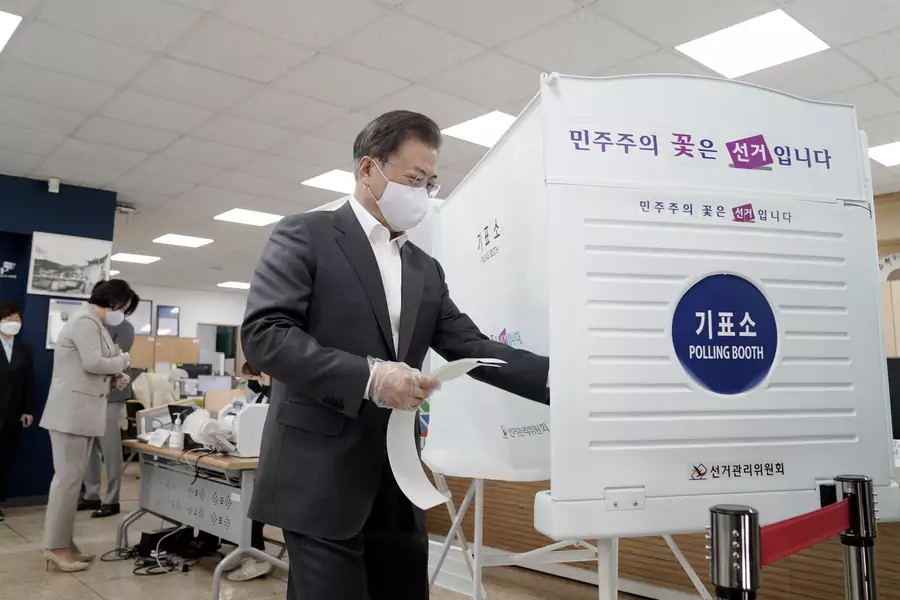The Pandemic Election and Moon's Leadership Choices

By successfully holding the first national democratic election following the spread of COVID-19, South Korea has both provided a model for other democratic election processes and a possible counterweight to those who believe democratic systems will fail under the weight of the public health burdens imposed by the virus. But does the Korean election outcome represent an all-too-rare triumph of effective bureaucratic organization over the global trend of nationalism?
With its sweeping victory, the incumbent Moon Jae-in administration enjoys an unprecedented mandate to implement its agenda for the next two years. Its success will now depend on Moon’s ability to discern whether Korean voters supported the ruling party based on performance or ideology. The election was first and foremost a referendum on the Moon administration’s handling of the COVID-19 crisis, so I see the public mandate as a reward for good performance. Moon’s win was not a vote for ideology, because the COVID-19 crisis crowded these issues off the electoral agenda.
More on:
Some worry that Moon will take the vote of confidence in his crisis performance and apply it to a policy agenda that narrowly rewards his constituents and eschews the broader public. The concern is that having campaigned on competency, Moon will govern based on ideology while relying on the appeals to Korean nativist nationalism that have taken hold within the left-wing of Korean politics. But such policies, most notably Moon’s economic policies and emphasis on cooperation with North Korea, have thus far failed to generate positive results.
Nathan S. Park sees the ruling Democratic Party’s election victory as representative of a watershed shift in South Korean politics from a conservative-dominated polity to a center-left polity in line with U.S. President Ronald Reagan’s generation-defining conservative victory in 1980. This assertion might prove true, but it is far too early to make such a categorical judgment.
Moon’s successful COVID-19 crisis management demonstrates a level of bureaucratic competency that was absent during the Roh Moo-hyun administration. I believe that Park’s sweeping judgement will only become true if the Democratic Party is driven by tangible outcomes based on performance rather than ideology. At this stage, a new Korean conservative opposition would need to emerge that is untainted by past political scandals and with a pragmatic policy platform could only challenge the ruling party if it proves to be incompetent or reverts to the political habits of self-dealing and corruption.
It will not be hard to discern whether Moon decides to use his unprecedented mandate to pursue ideological or performance-based objectives in the coming months. An ideological agenda will continue policies designed to privilege labor interests over regulatory flexibility, prioritize revenge against “accumulated evils” over measured judicial reforms, bend over backward to appease North Korean leader Kim Jong-un, and fan the flames of grievances in relations with Japan. Perhaps most worrisome would be the prospect for conflict over burden-sharing and North Korea policy within the U.S.-South Korea alliance that pits Korean progressive nationalism against U.S. President Donald J. Trump’s “America first” agenda.
A performance-driven Moon administration would build on the inclusive language he used in his 2017 inauguration speech, renew Moon’s pledge to “act as president for all the people,” overcome ideological divisions, promote social equity, and avoid corruption. In the absence of global political leadership and against the backdrop of tensions between China and the United States, the Moon administration has arrived at a unique diplomatic moment and has an opportunity to capitalize on its unique position on the right side of the curve. The bureaucratic competency of both the Korean Centers for Disease Control and the National Election Commission has earned South Korea standing to serve as a model for pandemic response that has already yielded political and economic benefits through exports of test kits and personal protective equipment.
More on:
But as the first wave of the pandemic eases and countries prepare for a possible resurgence in the fall, the Moon administration should fully take advantage of this leadership opportunity by providing a model that incorporates public health best practices into the task of getting back to work and stimulating the economy while maintaining COVID-19 mitigation and coping strategies.
South Korea’s early success and experience in analyzing virus data from its extensive testing and tracing systems might give it a leg up in anti-viral research, including in the race to develop and produce a vaccine. Until the vaccine is widely available, South Korea should promote its process and offer assistance and advice to fellow democracies on how to effectively manage the process of voting and keeping economic momentum amid a global pandemic.
In sum, South Korea should perpetuate its emphasis on effective bureaucratic management rather than a politicized approach to public health management. Such an approach can serve as a hallmark of the Moon administration’s domestic policies and as a facet of South Korea’s diplomatic branding overseas. Only performance, not ideology, will enable the ruling party to secure a lasting legacy.
This article was originally published in Korean by Munwha Ilbo.
 Online Store
Online Store